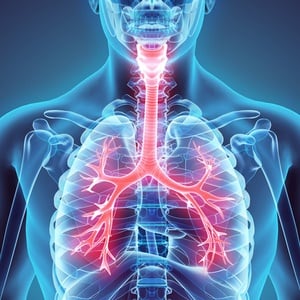
Acute severe asthma is characterised by severe bronchospasm.
Bronchodilators provide almost instant relief by relaxing the constricted muscles so that the airways can open. This is why you should always carry a bronchodilator with you.
Brochodilators do not treat the swelling caused by the underlying airway inflammation, but relieve the broncho constriction and open the brochioli again.
The number of times you use your brochodilator per day or week or month can help you determine your level of asthma control. One of the goals of good asthma management is that you should only use your brochodilator a maximum of once or twice a week. If you are using it more frequently, consult your doctor immediately.
If exercise acts as a trigger of wheezing, the prophylactic use of a bronchodilator may prove protective.
Inhaled bronchodilators
Inhaled medicine goes directly to the airways and, because the medicine is being delivered to the "target" organ, smaller doses are required as opposed to oral medicines which are delivered to the lungs via the blood. Spacer devices make it easier to administer inhaled medicines to children and the elderly if their co-ordination is poor or their breathing weak.
There are two types of inhaled bronchodilators:
- Short-acting beta2-agonists (chemical names include salbutamol, fenoterol and terbutaline). These provide immediate relief of asthma symptoms.
- Long-acting beta2-agonists (chemical names include formoterol and salmeterol). These drugs have a duration of 12 hours and can be used for troublesome nights and exercise-induced asthma (EIA). Long-acting beta2-agonists are used in combination with anti-inflammatory medication only when the anti-inflammatory agent provides insufficient asthma control.
Beta2-agonists are drugs that mimic some of the actions of adrenaline, the natural hormone involved in the body's involuntary response to a perceived threat, known as the "fight or flight" response.
Adrenaline primes the body for physical activity, causing the heart rate to increase and the airways to widen so that more oxygen can be delivered to the muscles. The desired effect of mimicking this response in asthma is obviously to widen the airways.
Beta2-agonists can also be taken orally, but because the dosages have to be higher than inhaled medication, the side effects may be more pronounced.
Possible side effects
- Palpitations, tremors and nervousness. People often believe that these agents will damage the heart but, when appropriately used, they help alleviate the strain on the heart which is experienced when blood is pumped through a "tight chest". Patients with underlying heart disorders should, however, only use beta2-agonists under the direction of a medical doctor as certain cardiac disorders may be affected by their use.
- Coughing or other bronchial irritation; dizziness or lightheadedness; dryness or irritation of the mouth or throat.
Theophyllines also known as methylxanthines
There are two groups of theophyllines which are available in tablet or injection form. These medicines relieve cough, wheezing and shortness of breath. They work by opening up the bronchial tubes (air passages of the lungs) and increasing the flow of air through them. They are used in extreme cases.
There are two types to choose from:
- Short-acting theophyllines which work for four to six hours.
- Long-acting theophyllines which work for about 12 hours. Long-acting theophyllines are administered in small doses and are usually used once or twice a day, and as an add-on therapy to anti-inflammatory medications. Under controlled medical circumstances they may be used intravenously to treat acute severe attacks. They are generally used, however, to provide long-term bronchodilation. Your blood levels will be monitored to ensure your dosage isn't too high. As with all medication, results should be carefully monitored and treatment discontinued if the medication isn't effective.
Possible side effects
- Over the past few years these medications have been prescribed less frequently because of the side effects they cause. Lower doses of theophyllins are also more frequently prescribed as this seems to offer the same benefits as the previously higher doses, but with fewer side effects. Overdosing can cause heart rhythm disturbance and seizures which may be fatal.
- Other side effects include nausea (a frequent and early symptom of toxicity), stomach pain, anxiety, headaches, palpitations, wakefulness and enuresis (bedwetting).




 Publications
Publications
 Partners
Partners











